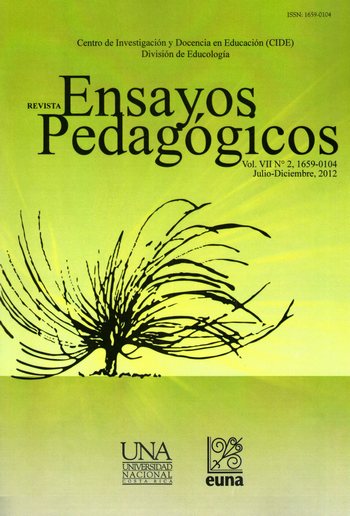Social, Political, and Phisolophical Aspects of the Education of Talented Children
DOI:
https://doi.org/10.15359/rep.7-2.6Keywords:
talented children, social, political and philosophical perspectives, gifted childrenAbstract
Talent is a topic that most people think they know, stimulate and deal with, but the truth is that few people can identify real talent. In Cost Rica, there are talented children that are not noticed, sometimes by their own parents and even by teachers, with little help to identify it and a treatment that does not fulfill their basic needs. They have the same rights and deserve an education according to their needs, in which their talents can be stimulated without their being confused with gifted children. At school, children do not have enough tools because teachers do not have the knowledge or training to identify them and provide the stimulation for their talent for them not only to highlight but also to adjust the programs to their needs. This is unfortunate, and it will be described later that this is a constant situation in this country. In the following essay, three perspectives around this topic will be described, and the ideas mentioned before will be elaborated on.
References
Asamblea Legislativa de la República de Costa Rica. (1998). Código de la niñez y la adolescencia. Recuperado de http://cpj.go.cr/docs/derechos/codigo-ninez.pdf
Asamblea Legislativa de Costa Rica. (2009). Ley para la promoción de la alta dotación, talentos y creatividad en el sistema educativo costarricense. Recuperado de http://documentos.cgr.go.cr/content/dav/jaguar/USI/normativa/2009/Proyecto/
Bernal, E. (1997). Perspectivas multinacionales de la superdotación y la educación de los niños superdotados: La trilogía española [Versión Digital]. Revista Ideacción, (10) Recuperado de http://www.centrohuertadelrey.com/files/fck//file/num_18_prespectivas_multinacionales.pdf
Castro, D., Pereira, Z., Solís, J., Ureña, K. y Villalobos, B. (2010). El talento en niños y niñas de I ciclo de la educación general básica: La perspectiva docente vrs la realidad educativa. Revista Educare, Vol. XIV, pp 97 – 112. Recuperado de http://www.revistas.una.ac.cr/index.php/EDUCARE/article/view/1530/1450
Consejo Superior de Educación. (2009). Acta Ordinaria No. 09 – 2009. Recuperado de http://www.cse.go.cr/pdf/ACTA09-23-09.pdf
Declaración Universal de los Derechos Humanos. (1948). Recuperado de http://www.derechoshumanos.net/normativa/normas/1948-DeclaracionUniversal.htm?gclid=CNePir6OyLECFQW0nQodJRkA4Q
López, J (2009). Talentos, prodigios o genios. Efdeportes Revista Digital 137. Recuperado de http://www.efdeportes.com/efd137/talentos-prodigios-o-genios.htm
Monturiol, S. (2005). Escuela desatiende a infancia talentosa. Recuperado de http://www.una.ac.cr/campus/ediciones/2005/marzo/2005marzo_pag03.html
Morales, K. (30 de junio de 2012) Mejores oportunidades para niños superdotados. La Nación. Recuperado de http://www.nacion.com/2011-02-07/Opinion/Foro/Opinion2675280.aspx
Munro, J. (2002). Understanding and identifying gifted learning: Disabled students. Recuperado de https://students.education.unimelb.edu.au/selage/pub/readings/giftedld/GLLDR-Understandidenti.pdf
Otero, N. (2009). ¿Qué hacer con un alumno de altas capacidades? Recuperado de http://www.eumed.net/rev/ced/09/nom5.htm
Pontificia Universidad Católica de Valparaíso. (2008). Programa Buenos Estudiantes con Talento Académico BETA – PUCV. Recuperado de http://www.programabeta.cl/descargas/Guia_para_la_identificacion_de_alumnos_con_talentos_academicos.pdf
Porquicho, J. (27 de mayo de 2012). El peaje que hay que pagar por tener una mente privilegiada. Diario de Cádiz. Recuperado de: http://www.diariodecadiz.es/article/cadiz/1013560/peaje/pagar/por/tener/una/mente/privilegiada.html
Saleiro, M. (1995). Nuevas perspectivas, nuevas direcciones en el diagnóstico y desarrollo de los niños superdotados y talentosos en Portugal. Revista Ideacción, (6), 10 – 13. Recuperado de http://www.centrohuertadelrey.com/files/fck//file/num_18_nuevas_prespectivas.pdf
The Council of Curriculum, Examinations and Assessment (2006). Gifted and talented children in (and out of) the classroom. Recuperado de http://www.edfac.unimelb.edu.au/eldi/selage/documents/GLT-Defininggiftedness.pdf
Torrego, J. et al (2011). Alumnos con altas capacidades y aprendizaje colaborativo. Madrid, España: Fundación SM.
Venegas, E. (2 de diciembre del 2012). Niños, niñas y jóvenes talentosos en Costa Rica. La Extra. Recuperado de http://www.diarioextra.com/2010/diciembre/02/opinion02.php
Vergara, M. (2006). Niños talentosos y marco legal en nuestro país. Revista E – Eccleston (5). Recuperado de http://ieseccleston.buenosaires.edu.ar/RevistaN%BA5_Vergara_Panzeri.pdf
Vergara, M (2007). El proceso de Inclusión escolar de alumnos con necesidades educativas especiales: De la teoría a la práctica. Recuperado de http://www.cedalp.com/articulo34.htm
Downloads
Published
How to Cite
Issue
Section
License
Ensayos Pedagógicos is subscribed to the Attribution-NonCommertial-NoDerivatives 4.0 International Creative Commons Licence, which allows both authors and readers to freely download, store, copy, and distribute the final approved publisehd version of the manuscript (post-print) as long as this is done without commercial purposes, no derivative works are generated, and the source and author are mentioned. As well, Ensayos Pedagógicos declares that authors will remain the rightful owners of the copyrights of their work in perpetuity.







